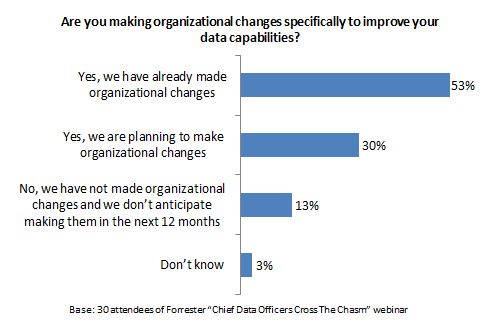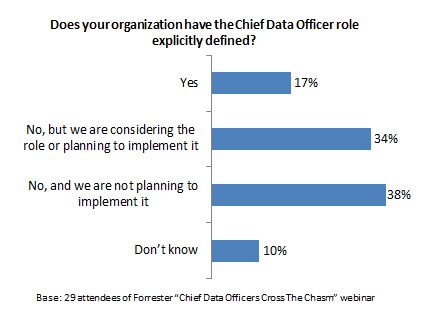Do You Need A Chief Data Officer?
You’ve heard it before but we said it again – this time in our recent webinar. There's a new kid in town: the chief data officer. Why the new role? Because of an increasing awareness of the value of data and the painful recognition of an inability to take advantage of the opportunities that it provides — due to technology, business, or basic cultural barriers. That was the topic of our webinar presented to a full house a few days ago; we discussed our recent report, Top Performers Appoint Chief Data Officers. Fortunately for those who weren’t there, the presentation – Chief Data Officers Cross The Chasm – is available (to clients) for download.
As the title suggests, chief data officers are no longer just for the early adopters – those enthusiasts and visionaries on the forefront of new technology trends. With 45% of global companies having appointed a chief data officer (not to be confused with a chief digital officer, as we specifically asked about “data”) and another 16% planning to make an appointment in the next 12 months – according to Forrester's Business Technographics surveys, the role of the chief data officer really has move into the mainstream.
However, there remain many companies who are not sure of whether they need a CDO or not. Many of those in our audience fell into that category. We asked two questions of the audience to gauge their interest and their actions to improve their data maturity:
- Are you making organizational changes specifically to improve your data capabilities?
- Does your organization have the Chief Data Officer role explicitly defined?
Over ½ of the webinar attendees who responded to the question had already made organizational changes to improve their data capabilities, and another 30% were planning on it. Only 13% hadn’t made such changes, nor were anticipating organizational change. (See below) There is clear consensus that something must be done to address data opportunities and challenges.

However, only 17% of those who responded had officially appointed a chief data officer, with another 34% considering the role or planning an appointment. (See below) While these numbers fall below the global average they are not surprising given the nature of the webinar topic. Many came wondering if they needed a CDO. Only 38% of respondents were not planning to hire a Chief Data Officer.

The webinar covered the basic state of the CDO role – Who has one? Who do they report to? What do they do? – and also presented some pretty compelling correlations between those organizations with CDOs and positive business benefits. Not only are organizations with a CDO more likely to achieve higher revenue growth, they are also:
- More likely be able to ensure compliance and reduce risk
- More likely to demonstrate business agility
- More likely to make data available within days, compared to weeks
- More likely to commercialize their data
- More likely to do a good job at attracting, hiring, training and retaining business intelligence talent.
Our recently published info graphic, Better Your Business Performance With A Chief Data Officer, illustrates these findings.
As for the webinar, hopefully some our attendees came away with a better understanding of what a CDO can do for them – both in terms of the functions they can perform and the results that likely ensue.
While we don’t explicitly say that everyone needs a CDO, the general consensus is if you’re asking the question, then you likely do.